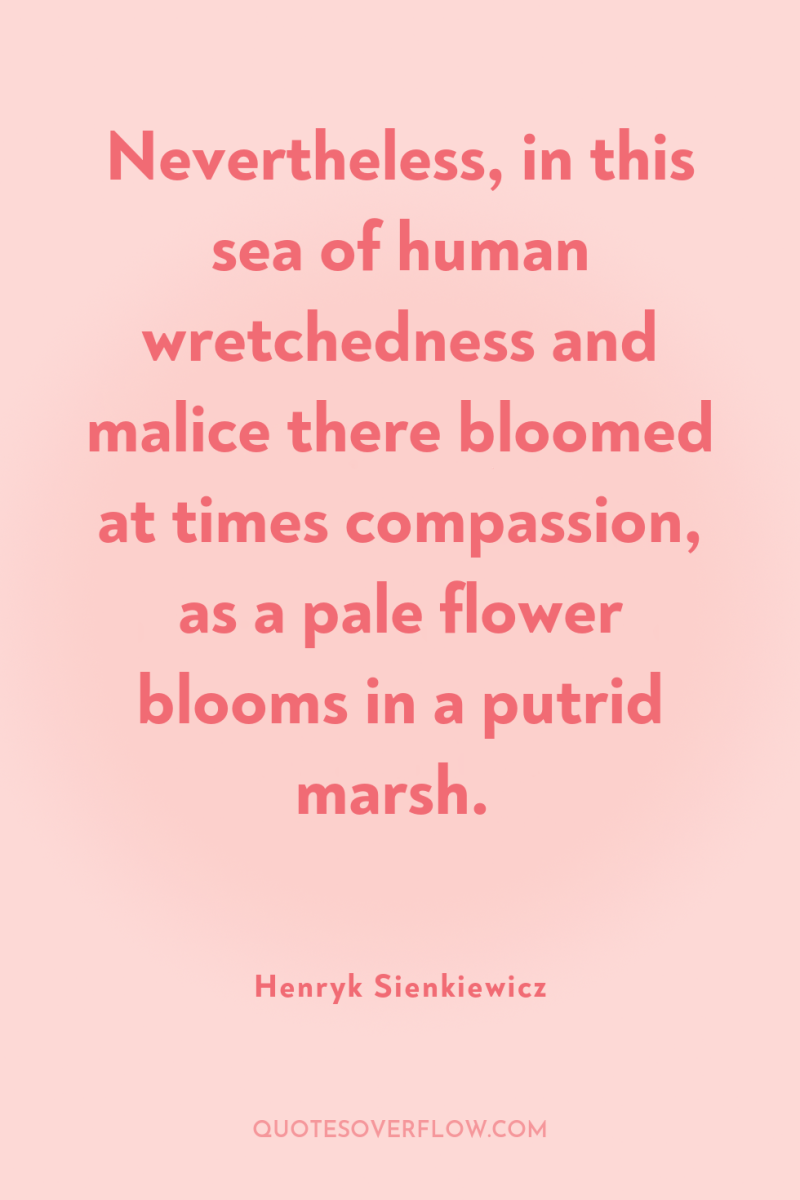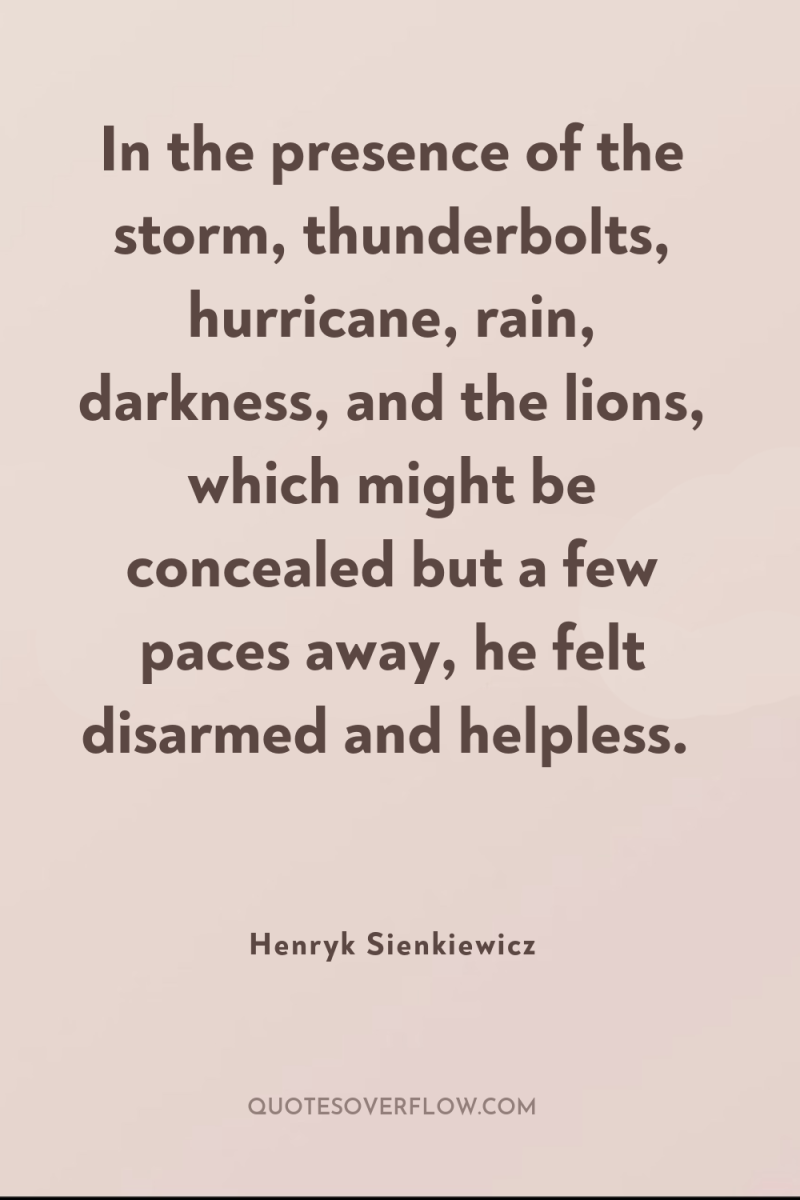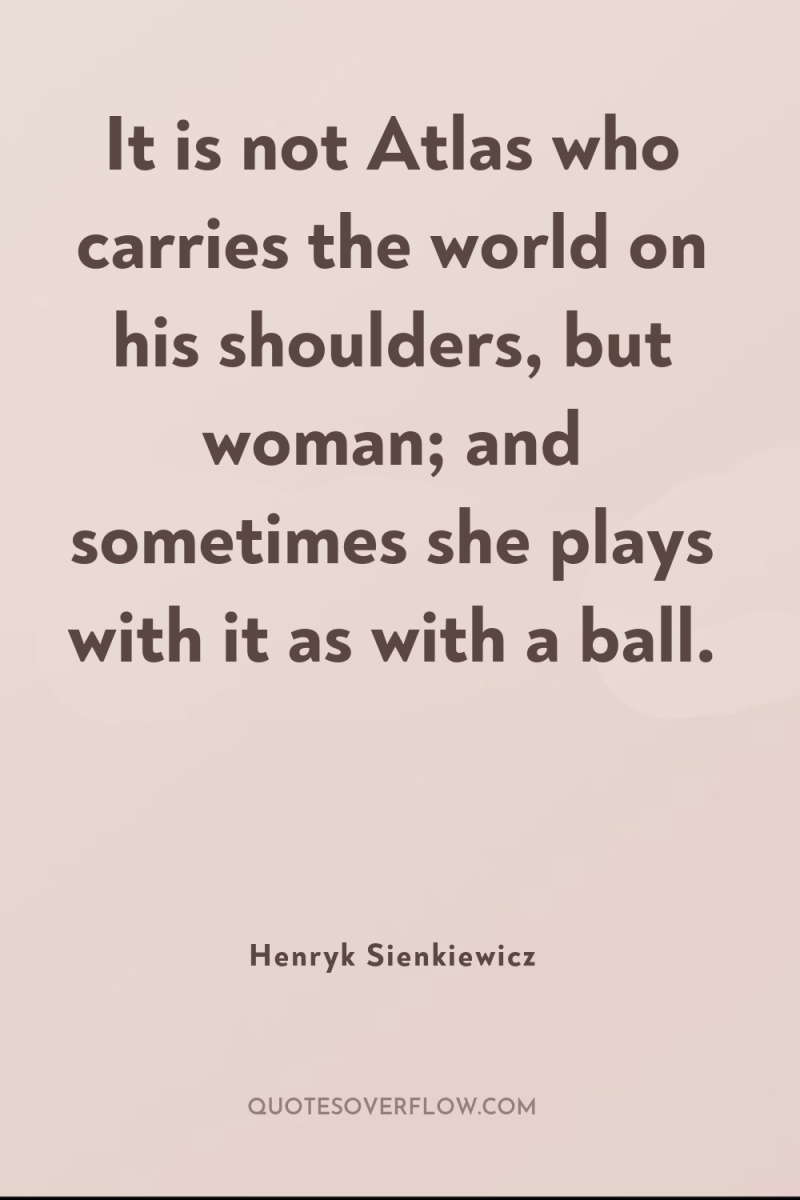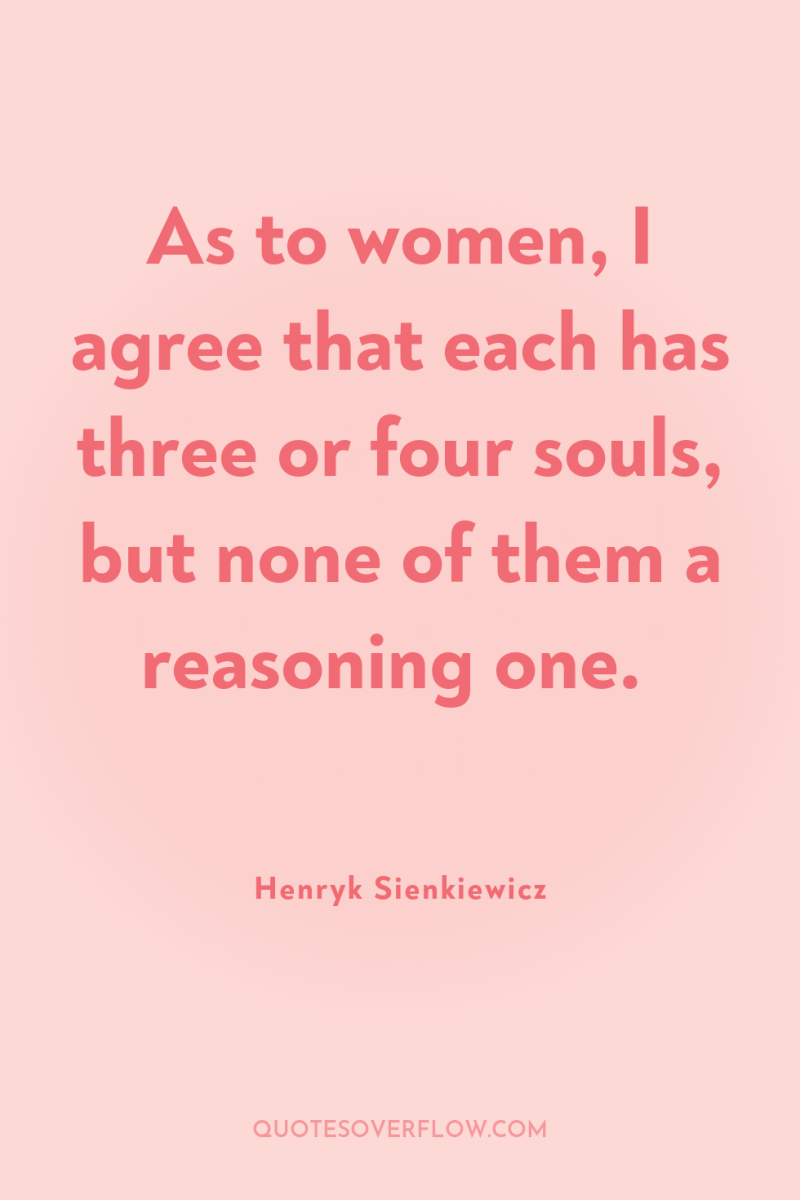
1
Nevertheless, in this sea of human wretchedness and malice there bloomed at times compassion, as a pale flower blooms in a putrid marsh.Henryk Sienkiewicz
2
There, about a dozen times during the day, the wind drives over the sky the swollen clouds, which water the earth copiously, after which the sun shines brightly, as if freshly bathed, and floods with a golden luster the rocks, the river, the trees, and the entire jungle.Henryk Sienkiewicz
3
It seemed that out of every tear of a martyr new confessors were born, and that every groan on the arena found an echo in thousands of breasts. Caesar was swimming in blood, Rome and the whole pagan world was mad. But those who had had enough of transgression and madness, those who were trampled upon, those whose lives were misery and oppression, all the weighed down, all the sad, all the unfortunate, came to hear the wonderful tidings of God, who out of love for men had given Himself to be crucified and redeem their sins. When they found a God whom they could love, they had found that which the society of the time could not give any one, -- happiness and love. .Henryk Sienkiewicz
4
Tell me, ' asked Stas, 'what is a wicked deed?' 'If anyone takes away Kali's cow, ' he answered after a brief reflection, 'that then is a wicked deed.' 'Excellent! ' exclaimed Stas, 'and what is a good one?' This time the answer came without any reflection: 'If Kali takes away the cow of somebody else, that is a good deed.' Stas was too young to perceive that similar views of evil and good deeds were enunciated in Europe not only by politicians but by whole nations.Henryk Sienkiewicz
5
Prophet, ' he said, 'Your doctrines I do not know; therefore if I accepted them, I would do it out of fear like a coward and a base man. Are you anxious that your faith be professed by cowards and base people?Henryk Sienkiewicz

6
In the presence of the storm, thunderbolts, hurricane, rain, darkness, and the lions, which might be concealed but a few paces away, he felt disarmed and helpless.Henryk Sienkiewicz
7
Amid the stillness of the night, in the depths of the ravine, from the direction in which the corpses lay suddenly resounded a kind of inhuman, frightful laughter in which quivered despair, and joy, and cruelty, and suffering, and pain, and sobbing, and derision; the heart-rending and spasmodic laughter of the insane or condemned.Henryk Sienkiewicz
8
In the meantime the groans changed into the protracted, thunderous roar by which all living creatures are struck with terror, and the nerves of people, who do not know what fear is, shake, just as the window-panes rattle from distant cannonading.Henryk Sienkiewicz
9
They did not, however, infect the air as the Sudanese sun dried them up like mummies; all had the hue of gray parchment, and were so much alike that the bodies of the Europeans, Egyptians, and negroes could not be distinguished from each other.Henryk Sienkiewicz

10
It is not Atlas who carries the world on his shoulders, but woman; and sometimes she plays with it as with a ball.Henryk Sienkiewicz

11
As to women, I agree that each has three or four souls, but none of them a reasoning one.Henryk Sienkiewicz

12
If we repay evil with good, then how do we repay the good?Henryk Sienkiewicz
13
And all at once he saw before him a precipice, as it were without bottom. He was a patrician, a military tribune, a powerful man; but above every power of that world to which he belonged was a madman whose will and malignity it was impossible to foresee. Only such people as the Christians might cease to reckon with Nero or fear him, people for whom this whole world, with its separations and sufferings, was as nothing; people for whom death itself was as nothing. All others had to tremble before him. The terrors of the time in which they lived showed themselves to Vinicius in all their monstrous extent.. Vinicius felt, for the first time in life, that either the world must change and be transformed, or life would become impossible altogether. He understood also this, which a moment before had been dark to him, that in such times only Christians could be happy. .Henryk Sienkiewicz
14
He always smiles, even when contemplating nothing good.Henryk Sienkiewicz
15
More than once have I thought, Why does crime, even when as powerful as Cæsar, and assured of being beyond punishment, strive always for the appearances of truth, justice, and virtue? Why does it take the trouble? I consider that to murder a brother, a mother, a wife, is a thing worthy of some petty Asiatic king, not a Roman Cæsar; but if that position were mine, I should not write justifying letters to the Senate. But Nero writes. Nero is looking for appearances, for Nero is a coward. But Tiberius was not a coward; still he justified every step he took. Why is this? What a marvellous, involuntary homage paid to virtue by evil! And knowest thou what strikes me? This, that it is done because transgression is ugly and virtue is beautiful. Therefore a man of genuine æsthetic feeling is also a virtuous man. Hence I am virtuous. .Henryk Sienkiewicz
16
...he began to fear whether in the presence of far greater events, all his acts would not fade into insignificance, just as a drop of rain disappears into the sea.Henryk Sienkiewicz
17
They were like two poor little leaves in a storm which bore death and annihilation not only to the heads of individuals, but to whole towns and entire tribes. What hand could snatch it and save two small, defenseless children?Henryk Sienkiewicz
18
He would not now conduct little Nell to the coast; he would not convey her by a steamer to Port Said, would not surrender her to Mr. Rawlinson; he himself would not fall into his father's arms and would not hear from his lips that he had acted like a true Pole! The end, the end! In a few days the sun would shine only upon the lifeless bodies and afterwards would dry them up into a semblance of those mummies which slumber in an eternal sleep in the museums in Egypt .Henryk Sienkiewicz
19
She wasted and grew so thin that she no longer was a little girl, but the shadow of a little girl. The flame of her life flickered so faintly that it appeared sufficient to blow at it to extinguish it. Stas understood that death did not have to wait for a third attack to take her and he expected it any day or any hour.Henryk Sienkiewicz
20
England is never in a hurry because she is eternal.Henryk Sienkiewicz
21
At most, a hundred paces separated him from them. The powerful beast, seeing the riders and horses, rose on his fore paws and began to gaze at them. The sun, which now stood low, illuminated his huge head and shaggy breasts, and in that ruddy luster he was like one of those sphinxes which ornament the entrances to ancient Egyptian temples.Henryk Sienkiewicz
22
The shots had dispersed the birds; there remained only two marabous, standing between ten and twenty paces away and plunged in reverie. They were like two old men with bald heads pressed between the shoulders.Henryk Sienkiewicz
23
But the French writers always had more originality and independence than others, and that regulator, which elsewhere was religion, long since ceased to exist for them.Henryk Sienkiewicz